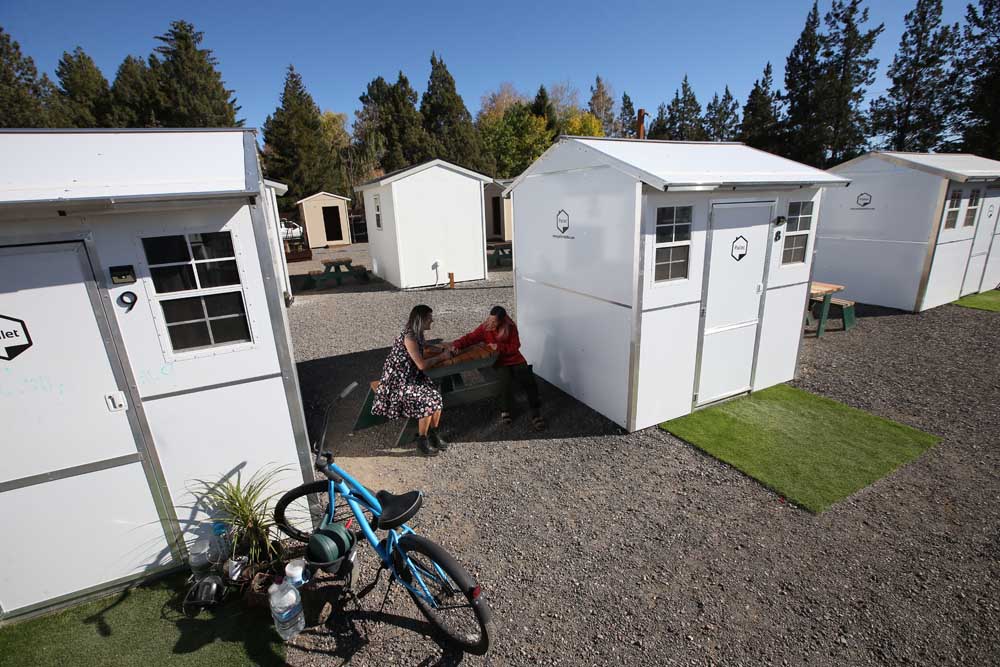Deschutes County homelessness office in limbo at end of two-year pilot
Published 5:45 am Saturday, July 27, 2024

- The Desert Streams Village, shown here in October, is a shelter for people experience homelessness.
In June 2022, Oregon lawmakers created eight new offices across the state and provided $1 million for each in an attempt to bring cities and counties together to address homelessness.
Two years later, the trial period for the Coordinated Houseless Response Office in Deschutes County is over.
Its leaders believe the office still has an important role to play in tackling homelessness in Central Oregon — but are still trying to figure out exactly what that role is.
“The question is, what do we do next?” said Cat Zwicker, a Redmond city councilor who serves on the homelessness office board.
How we got here
Deschutes County was one of eight agencies in Oregon to receive $1 million to create a coordinated homeless office through House Bill 4123, which was sponsored by Rep. Jason Kropf, D-Bend. The county, along with the cities of Bend, La Pine, Redmond and Sisters, signed an agreement to participate for five years, two of which were a pilot project.
Now, board members are weighing the possibility of folding the office into other regional efforts to address housing and homelessness. They hope the shift — colloquially dubbed “CHRO 2.0” — will stabilize an office that has stumbled out of the gate, but they remain wary of stifling the work it still hopes to accomplish.
A plan for homelessness in Deschutes County
So far, the office has spent about one-quarter of its $1 million award. The money must be spent at the end of the five years.
The office is in the midst of carrying out a five-year strategic plan for homelessness, which includes expanding services, collecting data, aiding the immediate unsheltered crisis and improving access to affordable housing.
As of last month, the office no longer has dedicated staff. Its former executive director, Cheyenne Purrington, left eight months after being hired in Sept. 2022, citing a lack of coordination and support. Chris Ogren, who was working as an analyst for the office, left in June.
Staff from participating governments have helped keep the office running, along with Tammy Baney, executive director of the Central Oregon Intergovernmental Council.
What now
At a work session on July 18, Baney walked the board through the possibility of marrying the homeless office with the newly-created Regional Housing Council, a pilot project focused on housing and homelessness. The new group includes elected officials, service providers and other community members.
Baney said the state has signaled that the coordinated homeless offices need to move away from their pilot structure to something more foundational.
One possibility is that the homeless office becomes a subcommittee of the new housing council, with a specific focus on unsheltered homelessness, Baney said. The change would more closely align the office with the larger, tri-county service area of the Homeless Leadership Coalition, through which state and federal funding for homelessness is funneled, including from Gov. Tina Kotek’s executive orders.
The council includes the three counties — Deschutes, Crook and Jefferson — and eight cities in Central Oregon, along with the Confederated Tribes of the Warm Springs.
According to Baney, the state has signaled that homeless offices created through HB 4123 need to evolve from their original models. The homeless office could still ensure that the remaining funds from Deschutes County’s $1 million award from HB 4123 are only spent within the county as intended, Baney said.
Local safe parking, housing expansion projects approved by homeless response office
“There wouldn’t be any change in the work that’s currently underway,” Baney said July 18.
Megan Perkins, a Bend city councilor and board member of the homeless office, said she sees positives and negatives to merging with the regional group. She recognized the need to shift to keep up with the state’s recommended model, but wants to make sure the office doesn’t lose sight of its strategic plan.
“We don’t want to lose steam,” she said in an interview.
Both Perkins and Zwicker said that despite early challenges, the office has completed good work this year.
Zwicker, who also serves on the Regional Housing Council, said the homeless office would likely be stronger under the purview of that group, but since it’s still a new project, doesn’t want to “reinvent the wheel.”
“When you get bigger, you can lose context and you can lose momentum because you are answering to a larger footprint,” Zwicker said in an interview.
She added: “I think there will be some pain points no matter what we do.”
The homeless office will continue discussions about future plans at its next meeting. Baney said she will recommend board members begin talks with the regional housing council to explore a potential merger.






